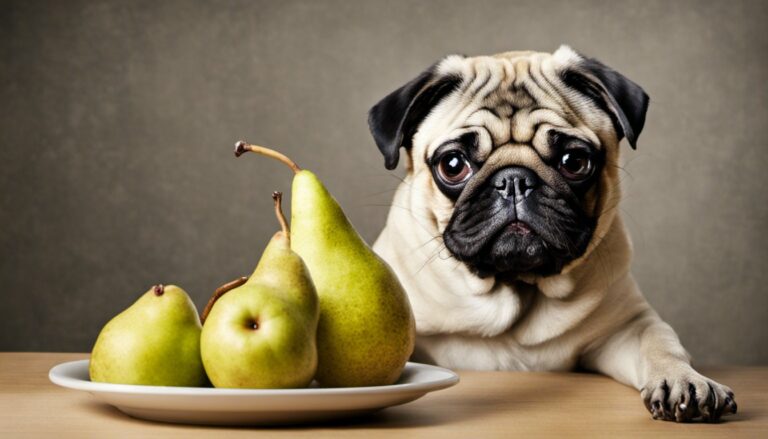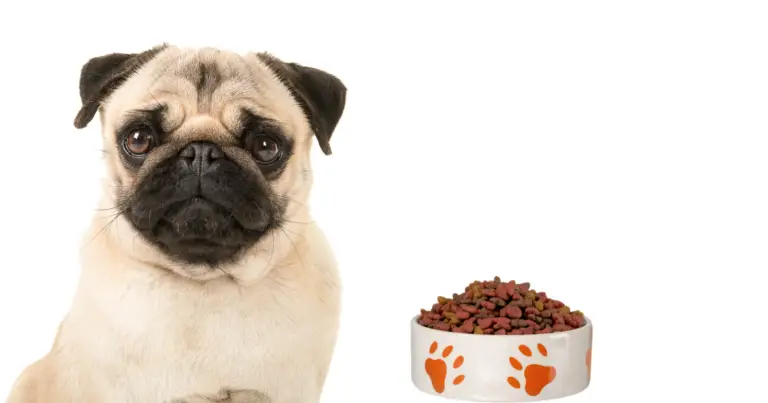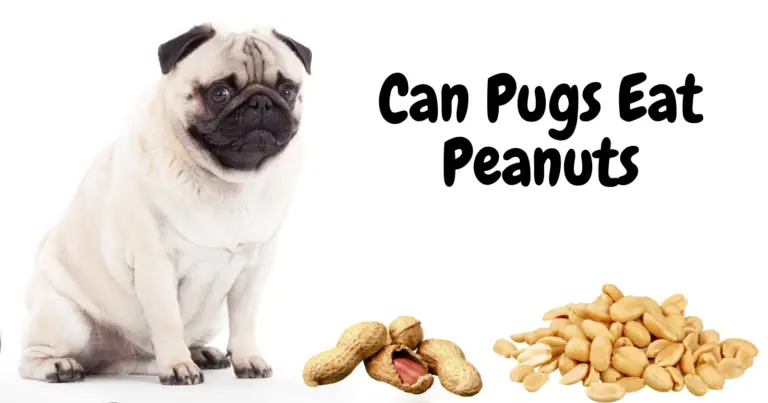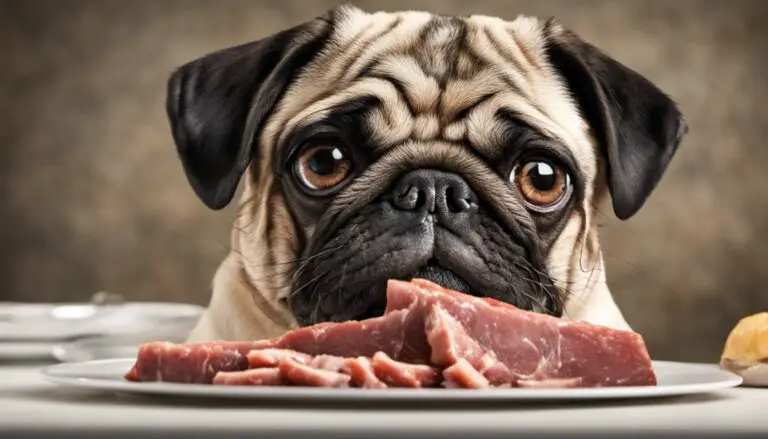Can Pugs Eat Fruit? A Clear Guide for Pet Owners
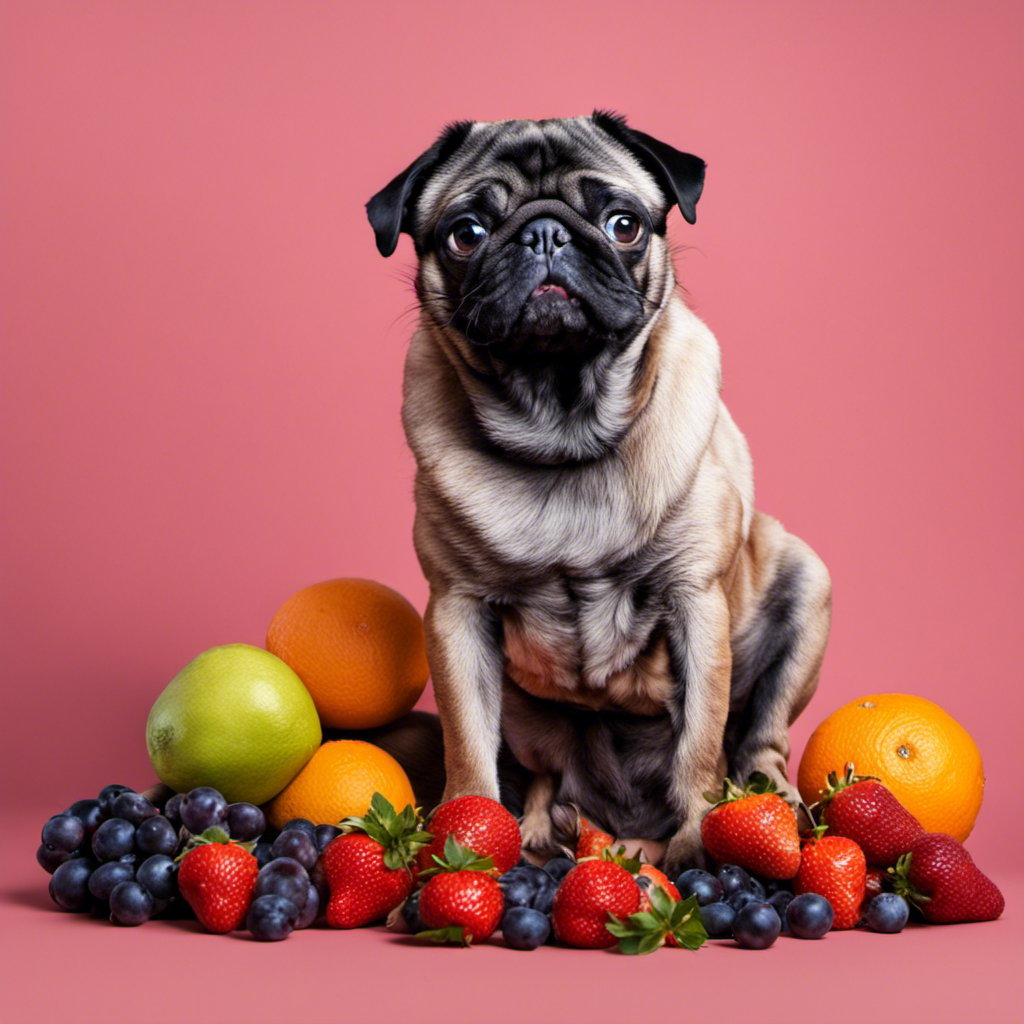
As a pug owner, you may find yourself wondering if your furry companion can safely enjoy fruits as part of their diet. Can Pugs Eat Fruit? This is an important question, as not all fruits are suitable for our canine friends, and some can even be harmful. In this article, we will explore the topic of pugs and fruit consumption, helping you make informed decisions about your pug’s nutrition.
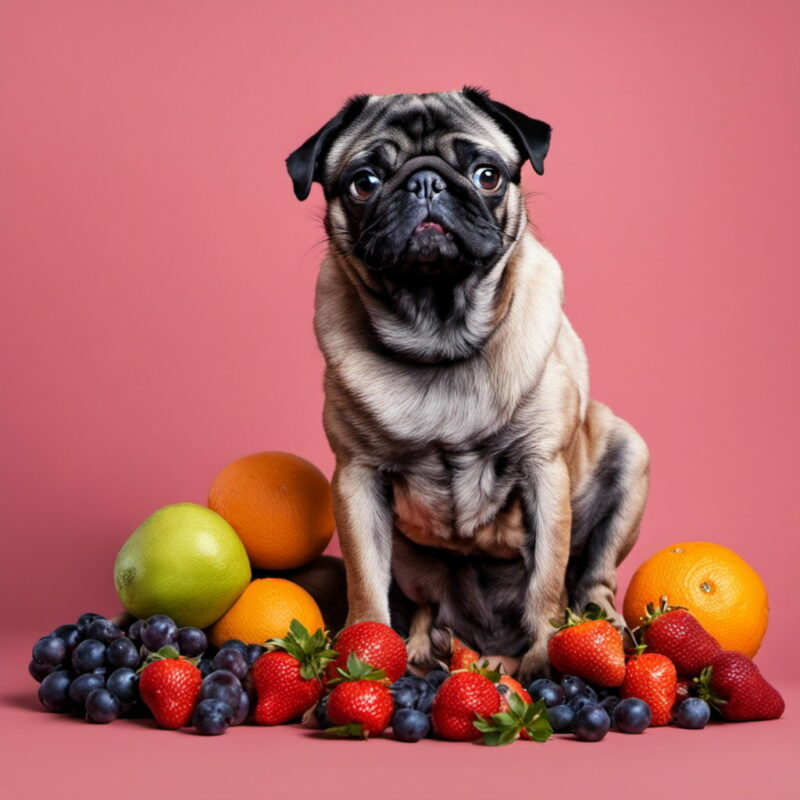
Many fruits provide vitamins, fiber, and other beneficial nutrients that can support your pug’s health. A popular fruit choice for pugs is the apple, which is a great source of vitamins A and C and fiber. Apples are also low in protein and fat, making them an ideal snack for senior pugs. Another fruit option is cantaloupe, which is both low in calories and high in water content, providing hydration and revitalization for your pug without the risk of weight gain.
It is crucial, however, to also be aware of the fruits that may be harmful to your pug. For instance, while apples are generally considered safe, avoiding feeding your pug apple seeds that can contain cyanide traces is important. When introducing a new fruit to your pug’s diet, it is advisable to do thorough research and consult a veterinarian to ensure the fruit’s safety and suitability for your pug’s specific needs.
Contents
Table of Contents
Understanding the Basic Diet of Pugs
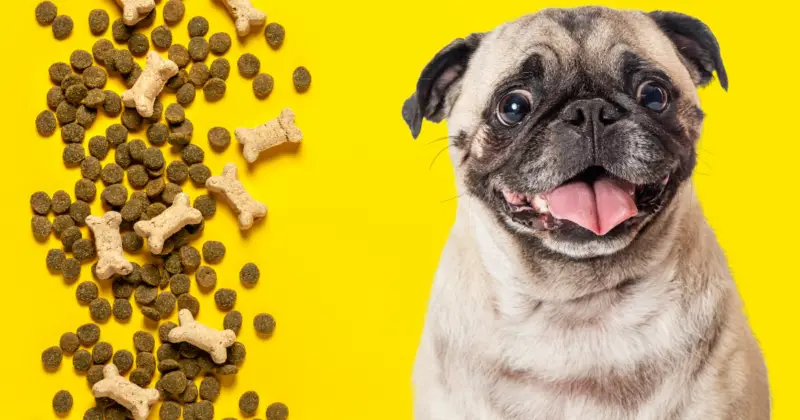
Pugs are a small breed of dogs with specific dietary needs. To best support their health and well-being, a proper diet is essential. A pug’s diet should include a balance of high-quality dog food, protein sources like meat, and various fruits and vegetables to provide essential vitamins and minerals. Remember to consult your vet for tailored dietary advice based on your pug’s needs.
Get The Free Food Eating Guide That Keeps My Pug Happy and Playful Even at 13 Years Old
100% Beginner Friendly & Lists Real Foods Your Pug Can Actually Eat!

High-quality dog food is the foundation of a pug’s diet. This type of food, such as Royal Canin Breed Health Nutrition Pug Dry Dog Food, is specifically designed for the nutritional requirements of pugs. These foods typically contain the right balance of calories, protein, fat, and other nutrients to support a pug’s overall health.
Meat is another important component of a pug’s diet, as it provides essential amino acids and protein necessary for healthy muscle development and maintenance. Raw meats and shredded bones can be a part of a pug’s diet, although it is crucial to consult your vet before switching to a raw food diet or considering any significant dietary changes.
Fruits and vegetables can be an excellent addition to a pug’s diet. They provide essential vitamins, minerals, and antioxidants, supporting the immune system and overall health. Some safe fruits for pugs include apples (without seeds), pomegranate, strawberry, and watermelon. Vegetables like carrots, peas, and potatoes can also be beneficial. However, moderation is key, and certain fruits, such as avocados, should be avoided due to their toxicity.
In conclusion, a balanced diet for pugs should consist primarily of high-quality dog food, meat sources, and a variety of fruits and vegetables. It is always essential to consult your vet when making changes to your pug’s diet or incorporating new ingredients to ensure optimal health and well-being.
Can Pugs Eat Fruit?
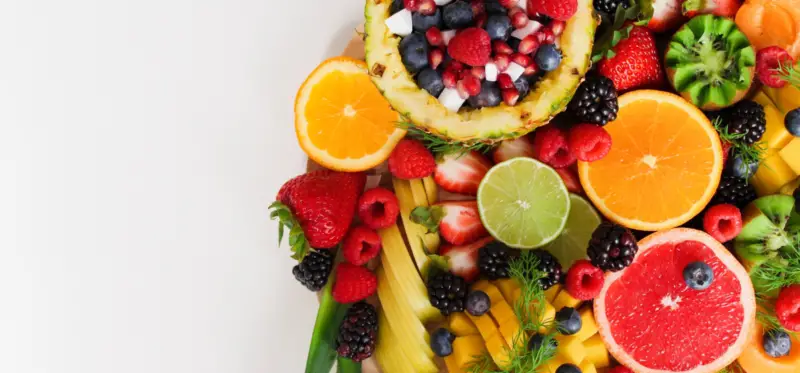
Fruits can be a healthy and enjoyable addition to your pug’s diet if given in moderation. Many fruits are safe for pugs to eat and are a great source of vitamins and minerals. Some fruits provide valuable antioxidants, which can help boost your pug’s overall health. However, not all fruits are suitable for pugs, and some can even be harmful.
Apples are a popular choice for pugs, as they are rich in vitamins A and C and fiber. Remember to remove the seeds and core, as apple seeds contain cyanide, which can be toxic to pugs if ingested in large quantities.
Bananas can also be a good option, as they are high in potassium and low in sodium, making them a healthy treat for pugs. However, keep in mind that they are high in sugar and should not be given too often.
Other safe pug fruits include blueberries, cantaloupe, kiwi fruit, and pears. These fruits are packed with antioxidants and provide a tasty, low-calorie treat. Like any other fruit, moderation is key, and it’s best to introduce new fruits one at a time to monitor for any allergic reactions or digestive issues.
While many fruits are safe, there are some your pug should avoid. Grapes and raisins can be toxic to pugs, causing kidney failure and even death. Avocados are also a no-go, as they contain a toxin called persin, which can upset your pug’s stomach and cause vomiting or diarrhea.
If you’re considering adding fruit to your pug’s diet, it’s best to consult with a vet to ensure you’re making safe and healthy choices. Remember to remove any seeds, leaves, and stems from the fruit, as these can often be harmful to pugs.
In summary, while many fruits can be beneficial for your pug’s health, moderation and caution are essential. Always consult with your trusted veterinarian before making any changes to your pug’s diet.
Can Pugs Eat Fruit? Watch this
Nutritional Benefit of Fruits for Pugs
Fruits can be a healthy and tasty treat for pugs when added to their diet in moderation. They contain a variety of essential nutrients, vitamins, and minerals that can help support their overall health. Some of the key nutritional benefits of fruits for pugs are discussed below.
Vitamin C and Antioxidants: Many fruits, such as apples, are rich in vitamin C, which helps in the proper functioning of pugs’ immune systems. Moreover, fruits also contain antioxidants, which protect their body cells from damage caused by free radicals. For instance, blueberries are high in antioxidants, which help maintain the health of a pug’s heart and brain.
Vitamin A and Beta-Carotene: Fruits like cantaloupe are good sources of vitamin A and beta-carotene, which are vital for the maintenance of healthy skin, coat, eyes, and immune system. Beta-carotene is converted into vitamin A inside the body, making it an essential nutrient for pugs.
Fiber: A high-fiber diet is crucial for pugs since it aids in healthy digestion and prevents constipation. Apples and pears, for example, contain significant amounts of fiber, which helps regulate your pug’s bowel movements.
Potassium and Magnesium: Potassium is an essential mineral that helps regulate fluid balance, muscle contractions, and nerve signals in pugs. Bananas are an excellent source of potassium and can be fed to your pug in small amounts. Magnesium, found in fruits like watermelon seeds, is important for maintaining the health of their muscles and nerves.
Iron and Copper: Iron is essential for the production of red blood cells, while copper plays a vital role in many bodily functions such as energy production, nerve function, and the formation of collagen in your pug’s body. Pumpkin seeds and dried apricots are examples of fruits containing iron and copper, respectively.
Vitamin B6 and Biotin: Vitamin B6 is necessary for maintaining healthy brain function and the formation of red blood cells. Biotin, also known as vitamin B7, is vital for keeping the skin and coat of your pug healthy. Fruits like bananas and raspberries are good vitamin B6 and biotin sources, respectively.
Including a variety of fruits in your pug’s diet can offer an array of nutritional benefits essential for their growth and well-being. However, it is crucial to ensure that you serve the right fruits in moderation and avoid those that can be harmful to your pug.
Fruits That Pugs Can Safely Consume
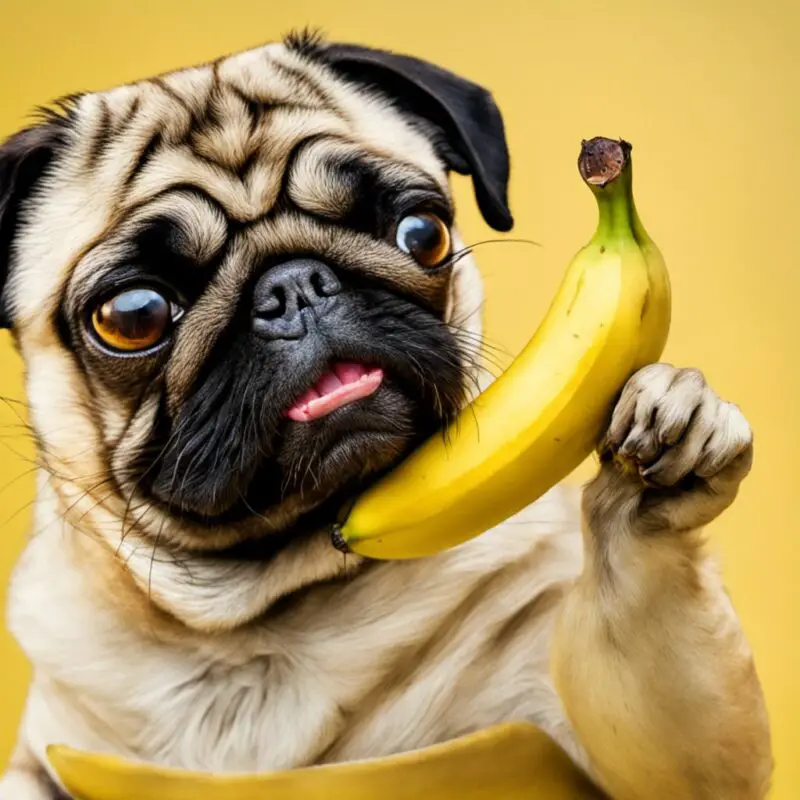
Pugs can enjoy a variety of fruits as a healthy snack in their diet. It’s essential to ensure that the fruits are safe for them to eat and provide valuable nutrients. Always remove seeds, stems, and inedible rinds when offering fruits, as they could be harmful.
Bananas are a rich source of vitamins and minerals and can serve as a delicious treat for your pug. They are high in potassium and easy to digest but should be given in moderation due to their sugar content.
Blueberries make a great snack for pugs as they are rich in antioxidants and vitamin C. They’re small, soft, and easy for them to consume, plus blueberries are known to support a healthy immune system.
Mango is a tasty treat for pugs when given in moderation. This tropical fruit is rich in vitamins A, B6, C, and E, providing a boost of nutrition. Make sure to remove the pit and skin before feeding the mango to your pet.
Oranges can also be fed to pugs in small amounts due to their acidic nature. They are rich in vitamin C and fiber, but make sure to remove the rind and seeds to prevent any digestive issues.
Carrots serve as a low-calorie snack rich in vitamins and fiber. Pugs can enjoy them cooked or raw, and they help maintain healthy teeth and gums by scraping off plaque while chewing.
Cantaloupe is an excellent source of vitamins A and C and can be a hydrating snack for your pug. Remove the rind and give them small pieces to enjoy.
Pears provide good nutritional value for pugs when given in moderation. They are rich in fiber and vitamins, but the seeds should be removed as they contain traces of cyanide.
Cucumber is a refreshing, low-calorie treat for pugs. High in water content, cucumbers help prevent dehydration and support digestion.
Coconut can be an occasional treat for your pug. It is rich in good fats and provides an energy boost. However, it should be given in small amounts to avoid weight gain.
Blackberries are another safe option for pugs as they are low in calories and high in vitamins, minerals, and antioxidants ^3^. Fresh or frozen blackberries make a healthy snack.
Cranberries can be safely fed to pugs in small amounts. These fruits offer beneficial antioxidants and vitamins, but due to their natural tartness, they might not be tolerated by all pugs. Always introduce new fruits carefully and monitor your pug for any adverse reactions.
The Risks of Some Fruits to Pugs
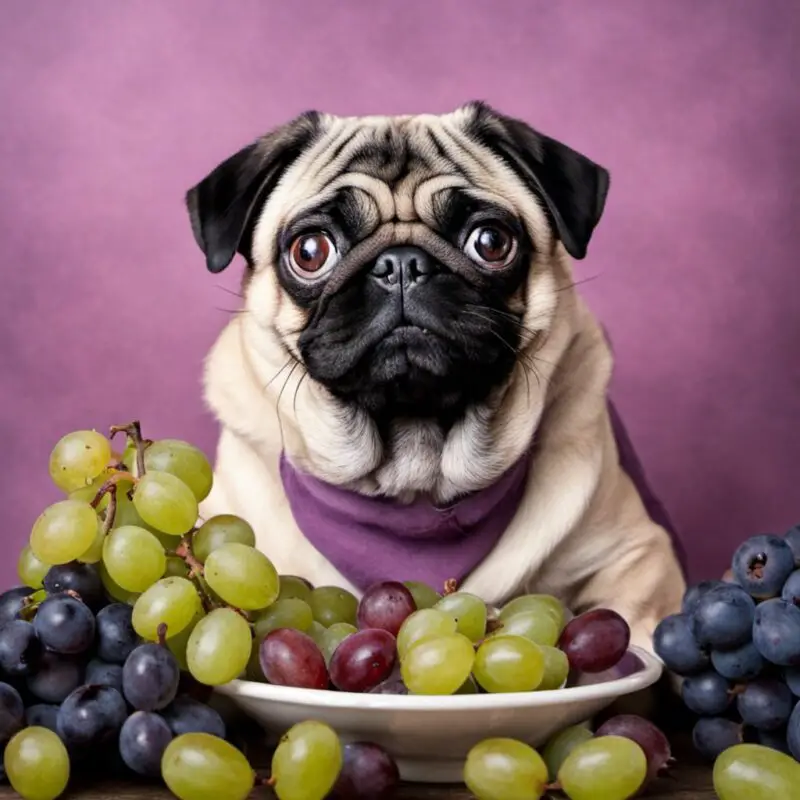
While fruits can be a healthy and delicious treat for your pug, it is essential to be aware of the risks associated with feeding certain types of fruits to your pet. Some fruits contain toxins that can be harmful to pugs and should be avoided.
Avocado is definitely not safe for your pug to consume, as it contains a toxin called persin. This substance can be found in the fruit, pits, leaves, skin, and the actual plant. Consuming avocados may cause vomiting and diarrhea in pugs.
Grapes are another fruit that should be kept away from your pug. The exact reason why grapes are toxic to dogs is still unknown, but even small amounts can lead to kidney failure. Signs of grape toxicity include vomiting, diarrhea, abdominal pain, and lethargy.
Cherries can also pose risks to pugs due to their pits, which contain cyanide. Although the pits pose the most significant threat, it’s best to avoid feeding cherries altogether to prevent your pug from accidentally ingesting a pit.
Apples are generally safe for pugs to eat, but the seeds should be removed before feeding, as they contain a small amount of cyanide. Ingesting a few seeds is unlikely to cause harm, but it’s still essential to remove them to be on the safe side.
In addition to being aware of toxins in specific fruits, monitoring your pug’s size and weight when feeding them fruit is crucial. Some fruits, like cantaloupe, are high in natural sugars, which can contribute to weight gain and obesity if consumed in large quantities.
By knowing the risks of various fruits, you can make informed decisions about which fruits to share with your pug. This will ensure your furry friend enjoys a tasty and nutritious treat without jeopardizing their health.
Preparing Fruits for Pugs

When offering fruits to your pug, it’s important to prepare them properly to ensure your pet’s safety and health. While many fruits are safe and nutritious for pugs, certain precautions should be taken when serving them.
Firstly, always remove seeds and pits from fruits, as they can be harmful to your pug. For example, apple seeds contain traces of cyanide, which can be toxic to dogs, so be sure to remove the core before offering apples to your pug. Similarly, peach pits can be a choking hazard and may contain small amounts of cyanide, making it essential to remove them as well.
Most pugs can digest fruit skin without any issues, but it’s a good idea to wash the fruits thoroughly to remove any pesticides or dirt. If you notice that your pug has difficulty digesting fruit skin, you can peel the skin off before offering the fruit.
Pugs can enjoy fresh and frozen fruits but cut them into bite-size chunks to avoid choking hazards and make it easier for your pug to chew and digest. Frozen fruits, such as cantaloupe, can be a refreshing treat on a hot day and provide hydration. However, be mindful of the temperature, as extremely cold fruits may cause discomfort.
Preparing fruits for your pug involves removing any potentially harmful parts, such as seeds, pits, or skins, when necessary, and serving the fruit in small, manageable pieces. These precautions will help ensure your pug enjoys a tasty and safe fruit treat.
Potential Health Issues from Eating Fruits
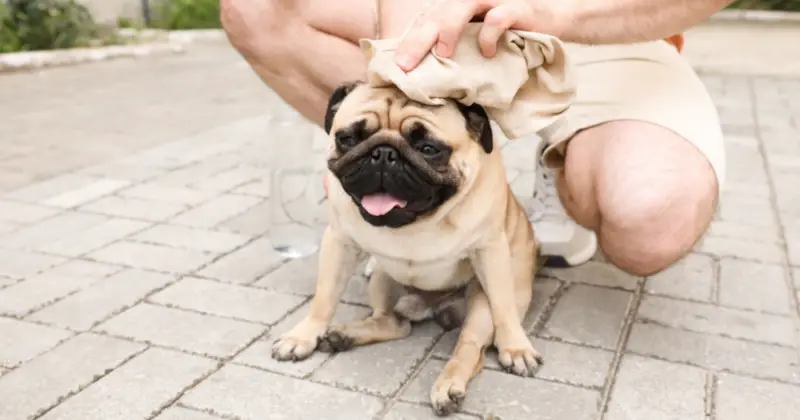
Feeding fruits to pugs can possess some potential health risks if not done in moderation or if certain toxic fruits are given. High sugar content, negative effects of excessive fat, and calorie intake can lead to health problems in pugs, such as overweight and obesity. Overweight pugs can experience symptoms such as weakness, loss of appetite, and difficulty in mobility.
Some fruits contain a high sugar content that, when consumed in large quantities, can result in vomiting and diarrhea. These gastrointestinal issues clearly indicate that the fruit is unsuitable for your pug or has been fed in excessive amounts. It is essential to monitor your pug’s diet closely and provide fruits in moderation to avoid such complications. Remember that while fruits may provide vitamins and minerals, too much of anything can be detrimental to your pet’s overall health.
Aside from high-sugar fruits, there are certain fruits that are toxic to dogs, including pugs. One example is avocado, which contains persin, a toxin harmful to these pets as it can lead to vomiting and diarrhea when consumed. Keep your pugs away from such toxic fruits, as ingestion of these can be fatal in severe cases.
Another potential risk when feeding fruits to pugs is the chance of obstruction. Fruit seeds and pits, for example, can become lodged in your pug’s throat or gastrointestinal tract, leading to choking hazards and intestinal blockage. Be cautious when feeding fruits with seeds or pits, and remove them before offering them to your pet to minimize the risk of complications.
In summary, feeding fruits to your pug can be beneficial when done correctly and in moderation. Be mindful of the sugar, fat, and calorie content when choosing fruits for your pug, and always avoid toxic fruits that can lead to severe health issues. If you notice any adverse symptoms or suspect an obstruction, consult your veterinarian for assistance.
Alternatives to Fruits in Pug’s Diet
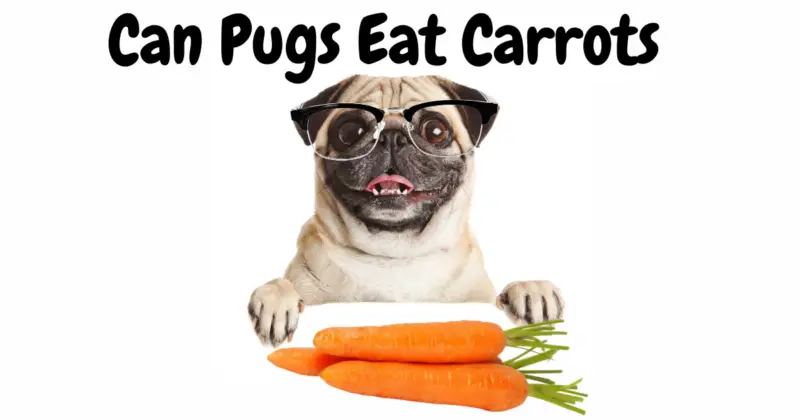
While fruits can be a healthy addition to a pug’s diet, it is also essential to consider other nutritious options. Vegetables are an excellent alternative as they provide a range of vitamins and minerals that contribute to a pug’s overall health. Many vegetables can be offered as a low-calorie snack, either fresh or frozen, making them a delightful treat for your canine companion.
Carrots and cucumber are both fantastic options for pugs. Carrots are rich in vitamins A and K, potassium, and fiber, which are essential for maintaining good eye health and digestion. Conversely, cucumbers are high in water content, making them an ideal hydrating treat for your pug, especially during warmer months. Both of these vegetables can be served fresh or frozen, providing a crunchy and refreshing snack.
Aside from carrots and cucumbers, there are several other vegetables that are beneficial for pugs. Some healthy options include:
- Broccoli: This nutrient-dense vegetable is an excellent source of vitamins C and K and various antioxidant compounds that aid in maintaining a strong immune system. Ensure that pugs receive only small quantities of broccoli, as it could cause digestive upsets when consumed in excess.
- Sweet Potatoes: High in dietary fiber, vitamins A and C, and minerals such as manganese and potassium, sweet potatoes can support healthy digestion and immune function. They can be served cooked and mashed or as dehydrated treats.
- Spinach: Rich in vitamins A, C, and K, as well as iron and calcium, spinach can promote strong bones and teeth while supporting overall growth and development. However, it should be fed in moderation due to its high oxalate content.
In conclusion, incorporating vegetables, such as carrots and cucumbers, into a pug’s diet provides a diverse range of nutrients that are essential for maintaining optimal health. Offering these low-calorie snacks, either fresh or frozen, ensures your pug remains strong, healthy, and satisfied.
Closing Thoughts

Pugs, like all dogs, have their specific dietary needs and restrictions. As a pug owner, it is essential to be aware of these differences to ensure your pug stays happy, healthy, and safe. Offering a variety of fruits as occasional dog treats can provide your pug with valuable nutrients and add some excitement to their diet.
Many fruits are safe for pugs to consume and can serve as nutritious, low-fat alternatives to commercial dog treats. Fruits such as apples provide vitamins A and C and fiber, which can benefit your pug’s digestive health. However, be cautious when giving a pug any fruit, ensuring all seeds and pits are removed before feeding.
Despite the benefits of some fruits, it’s important to remember that a pug’s digestive system differs from a human’s. This means that not all fruits are suitable for pugs, and even smaller amounts of some can have detrimental effects on their health. It is crucial to research which fruits are safe before feeding them to your pug, and always consult with your veterinarian if you are unsure about a particular fruit.
To summarize, a responsible and informed pug owner knows that while many fruits can serve as healthy treats for their pet, it is always important to prioritize your pug’s dietary needs. Providing a balanced diet with occasional fruit treats can contribute positively to your pug’s health, making them a valuable addition to their life.
Frequently Asked Questions: Can Pugs Eat Fruit
Can Pugs safely consume apples?
Yes, Pugs can safely eat apples. They are a great source of vitamins A and C, as well as fiber. Apples are low in protein and fat, making them a suitable snack for Pugs. However, remember to remove the seeds and core as they can be harmful to your pet.
Are strawberries acceptable for Pugs to eat?
Strawberries can be an acceptable treat for Pugs when given in moderation. They contain vitamins and antioxidants that can be beneficial to your dog’s health. Be sure to remove the leaves as they may cause digestive discomfort. Additionally, it is recommended to serve them in small quantities as too many strawberries can lead to an upset stomach.
Is watermelon a good fruit choice for Pugs?
Watermelon is a good fruit choice for Pugs as it is low in calories and high in water content, which can help keep them hydrated. However, it should be given in moderation and without the seeds or rind, as they can pose choking hazards or gastrointestinal upsets.
Can Pugs eat bananas without harm?
Bananas can be consumed by Pugs without any harm, provided they are given in controlled amounts. Bananas are a great source of vitamins, minerals, and natural sugars. However, excessive consumption may lead to weight gain and increased sugar levels, so make sure to provide this fruit in moderation.
Are blueberries safe for Pug consumption?
Blueberries are safe for Pug consumption and can be a healthy snack option. They are loaded with antioxidants and essential nutrients that can be beneficial for your dog’s overall health. Like other fruits, remember to give them in moderation to prevent any adverse effects.
Which fruits should be avoided by Pugs?
Certain fruits should be avoided by Pugs as they can be harmful or toxic to their health. Examples include grapes and raisins, which can lead to kidney failure, and avocados, which contain a toxin called persin that can harm your dog. It’s also crucial to prevent your Pug from consuming fruit seeds and pits, as some of them contain harmful chemicals or can pose a choking hazard.


